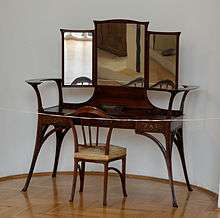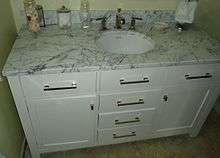vanity
English

Vanity (dressing table)

Bathroom vanity
Etymology
From Middle English vanite, borrowed from Old French vanité, from Latin vānitas, from vānus, whence English vain.
Pronunciation
- IPA(key): /ˈvæ.nɪ.ti/
Audio (US) (file) Audio (UK) (file)
Noun
vanity (countable and uncountable, plural vanities)
- That which is vain, futile, or worthless; that which is of no value, use or profit.
- 1611, “Ecclesiastes 2:15-16”, in The King James Bible:
- Then I said in my heart, As it happeneth to the fool, so it happeneth even to me and why then was I more wise? Then I said in my heart that this is also vanity.
For there is no more remembrance of the wise than the fool forever; seeing that which now is in the days to come shall all be forgotten. And how dieth the wise man? as the fool.
-
- Excessive pride in or admiration of one's own abilities, appearance or achievements.
- A dressing table used to apply makeup, preen, and coif hair. The table is normally quite low and similar to a desk, with drawers and one or more mirrors on top. Either a chair or bench is used to sit upon.
- A washbasin installed into a permanently fixed storage unit, used as an item of bathroom furniture.
- Emptiness. (Can we add an example for this sense?)
- (obsolete) Any idea, theory or statement that is without foundation.
- It is a vanity to say that if two stones are dropped from a tower, the heavier will experience the greater acceleration.
- Francis Bacon
- To help the matter, the alchemists call in many vanities out of astrology.
Synonyms
- conceit
- egotism
- narcissism
- pride
- See also Thesaurus:arrogance
Derived terms
Related terms
Translations
that which is vain
excessive pride
|
|
dressing table — see dressing table
Further reading
- vanity in Webster’s Revised Unabridged Dictionary, G. & C. Merriam, 1913.
- vanity in The Century Dictionary, New York, N.Y.: The Century Co., 1911.
This article is issued from
Wiktionary.
The text is licensed under Creative
Commons - Attribution - Sharealike.
Additional terms may apply for the media files.